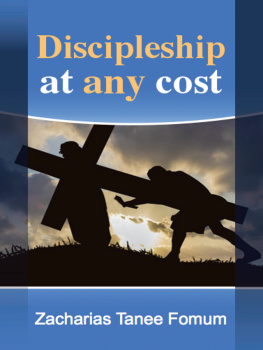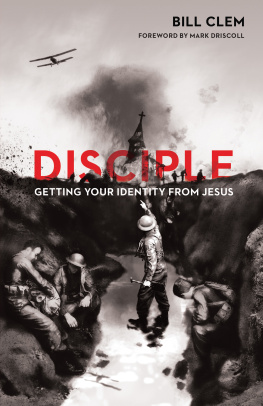DISCIPLESHIP AT ANY COST
By
Zacharias Tanee Fomum
Copyrights 1977 Z.T. Fomum
Published by
the ePublishing unit of the Book Ministry CMFI
http://www.cmfionline.org
ztfbooks@cmfionline.org
TABLE OF CONTENTS
Chapter 1
THE COST OF DISCIPLESHIP
A disciple of Christ is a person who has, first of all, received the Lord Jesus Christ as his or her personal Saviour and is therefore reconciled to God, and, secondly, has set his whole heart, mind and all to seek Him. The disciple makes Jesus his all and forsakes everything that may stand in the way of his fellowship with Christ. Such a one has Christ for his all in all and desires nothing outside of Him. Such a relationship with Christ in which he becomes our all in all is very costly and, since the Lord Jesus warns us to count the cost, let us look at the cost.
FORSAKE SIN
Becoming a disciple and remaining one will cost us the giving up of all sin. The Saviour, whose disciples we want to be, separated Himself from sin and lived a sinless life, so much that He was able to challenge His enemies, saying, Which one of you accuses me of sin? They were silent because He was perfect. So the disciple who is a learner from Jesus Christ has no choice but to learn to walk in the same way of purity. Our Saviour is a Holy Saviour and we cannot really come after Him unless we definitely part with all the sin that is in our lives. It is impossible for a sin-hating Christ to lead a band of sin-loving disciples.
When we talk of sin, we are naturally reminded of the law - the Ten Commandments. We should, however, consider also their implications: Our Lord said that looking at a woman lustfully is, in fact, committing adultery; that hatred and harbouring anger against someone are equivalent to murder. Similarly, we should remember that pride includes rudeness, or considering ourselves a little better than others; that gossip is idleness and probably betrays a lack of real concern for the people that we gossip about; that drunkenness, masturbation and reading bad books are all part of sensuality. We are often tempted to exaggerate our problems, successes or even spiritual experiences. All exaggerations and half-truths are lies and therefore sinful before God. Sadly, people who know the Lord Jesus, and therefore should know better, are often caught up in sins like these; and we give the world the impression that there is no victory in the Lord. This is even more hopeless when we say to each other, We are Spirit-filled, and yet continue to live in sin. If sin rules in our lives, then one thing is obvious: we are not Spirit-filled; for the Holy Spirit cannot fill a dirty vessel. When the Holy Spirit wants to fill a person, He first cleanses that person of all sin, then permeates every area of that persons life, bringing it under obedience to Jesus. Where there is sin, the Holy Spirit is obviously very limited.
If our attitude to sin is not settled, if we lack that Spirit-created hatred for sin and do not labour in prayer and in practice to be freed from all sin, then we cannot be disciples. We may continue as Christians and even deceive ourselves that we are serving Christ. Others may think we are serving the Lord, but let us not be deceived; for God does not see as man sees. Man looks on the outside, but God looks on the heart. The Lord is looking on our hearts today. What does He see? Does He see a clean heart that hates sin, or does He see one stained and defiled by sin?
If we are sinful, then the place to begin is at the cross. We must face God and tell him exactly what we are. We must tell Him, Lord, l have sinned. We must also name our sins before Him and be very specific.
It is futile to confess in a general way or to leave some sins out. That is mockery to God. After confessing, we must turn our backs to sin in a definite act and ask Him to forgive and cleanse us. This must be followed by restitution in which we restore that which we destroyed through sin. Finally, we must ask the Holy Spirit to take over every inch of our lives and possess it for God. This is basic to discipleship.
FORSAKE POSSESSIONS
Discipleship will cost us our possessions. The early disciples gave up everything when Jesus asked them to come after Him so that He would make them fishers of men. We are told of Peter and Andrew who, straightaway, forsook their nets and followed Him, of James and John who left their father, Zebedee, in the ship with the hired servants and went after Him, and of Matthew who immediately rose and followed Him. For the fishermen, following Christ brought an end to their fishing career. For Matthew, it brought an end to his comfortable financial position; yet he did not wait to determine how his pension was going to be settled. The fish and the money were abandoned in one decisive act without regret or questioning. All they knew was that Jesus the Lord had asked them to come. His invitation was urgent and forthwith. These disciples had a choice. They could have offered a very intelligent and legitimate excuse: the business would collapse and their families would suffer. But they did not. All of them straightaway left all and followed Him. Compare these to the rich young ruler: He came to Jesus running, bowed to Him and asked a question of the utmost importance. He came running to show that he understood the urgency of things. He came to the right person, the Lord Jesus. He bowed down in acknowledgement of Jesus as Lord, and asked the right question. Jesus said to him,
If you would be perfect, go, sell what you possess and give to the poor, and you will have treasure in heaven; and come, follow me. When the young man heard this he went away sorrowful; for he had great possessions. (Matthew 19:21-22).
We may begin to say,
Thank God we do not have great possessions,
but what about the one hundred shillings, or the ten shillings or the one shilling that we have? Are we willing to give it away for the Lords work? If we do not give our ten shillings when we have little, we will not be able to give a hundred or a thousand shillings when we have much. It seems easier to have money for a new shirt or house than to have the same amount of money for the Lord. How sad!
We should look at our possessions and prayerfully ask the Lord if we should give some away to people in need. One resident Christian University student decided to offer his lunch for one term to a poor non-resident student who had very little money. Every day, this Christian young man had breakfast and supper and gave his lunch to the poorer non-Christian student. It was costly, but by the end of the term, this sacrificial love won the non-Christian to the Lord.
Maybe we should face up to the fact that we are lovers of money and possessions; indeed, lovers of the world, and that the command which says,
Do not love the world or the things in the world, (1 John 2:15),
has not been obeyed. Could it be that the love for the Father is not in us? Very few of us are giving anything substantial to the Lords work. Of course, we can throw in one silver coin, or five or occasionally ten of them, but is that giving? God is not a rubbish heap on which we throw the things we do not want. If we give God just what we can give away comfortably without its hurting us, then we have really not known what it means to give. We ought to give until it hurts. God is not a beggar, and many of us today say, Praise the Lord, whereas, in fact, we, like the rich young ruler, are too rich to forsake all.













